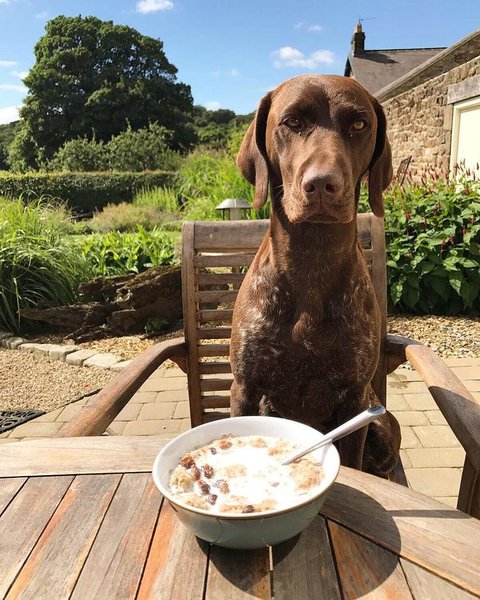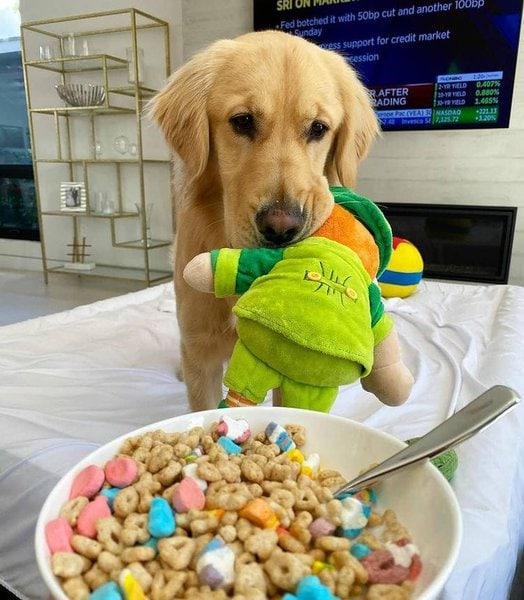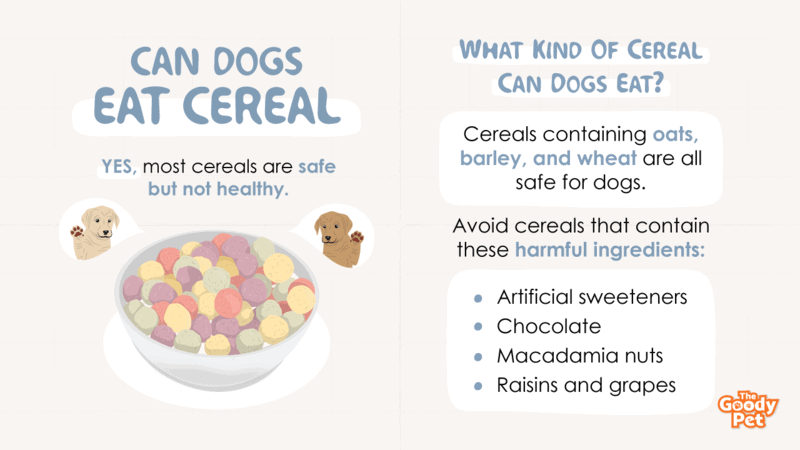One of my friends has a toddler whose favorite thing to do is sneaking cereal to their dog, and the dog loves it. He asked me if dogs should eat cereals and why there are no cereals specifically made for dogs.
Yes, dogs love cereals, but most of them are not healthy and have no nutritional value. You can safely feed your furry friend with some cereals as a treat, but ensure that the products don’t contain chocolates, raisins, and nuts, as these are harmful to dogs.
Ideally, whole-grain cereals are better since they contain high fiber content and less sugar. Avoid sugary and processed varieties, as they have adverse effects on your pup’s health. Whenever you offer cereal to your canine, moderate the serving.
Before getting to some of the healthy cereals for dogs, let’s see what’s the issue with cereals and what you should look at before giving your furry friend a handful of cereals.
Why Are Cereals Bad For Dogs?

Cereals are made for human consumption, and as you know, while most human foods are safe for dogs, they are not healthy for dogs. That’s why you can’t feed your furry friend with the food you are eating as the main meal. Even if it’s harmless, it doesn’t contain the required nutritional composition.
That applies to cereals; most brands are dog’s safe but have no nutritional value. However, some cereal brands contain ingredients that are harmful to dogs. Before treating your pooch with cereals, confirm that it doesn’t contain any of these ingredients:
- Artificial sweeteners (Xylitol)
- Chocolate
- Macadamia nuts
- Raisins and grapes
Sugar
The first concern with most cereals is the use of artificial sweeteners and sugar levels. Cereals containing over 0.35 oz of sugar per serving increase the risk of obesity, which causes severe complications like high blood pressure and even diabetes, eventually leading to death.
Sugar also contributes to dental issues, including tooth decay when cereals stick on the teeth. Sugary cereals can also lead to diarrhea and vomiting and serious diseases such as pancreatitis and liver failure.
Cereals with high sugar content include Fruit Loops, Lucky Charms, and Frosted Flakes, among others.
Raisins
Raisins and grapes are harmful to dogs as they can cause kidney failure. Raisins are so harmful that even one raisin can lead to death. So, treat any cereal that contains raisins as “harmful.”
Call a vet for an immediate examination if your dog eats raisins, even if they are not showing raisin intoxication symptoms like diarrhea, vomiting, shivering, and dehydration.
Cereals that include raisins include Cocoa Puffs, Raisin Bran, and Reese’s Puffs, among others.
Chocolate
Never give your four-legged furry friend any cereal that contains chocolate. Just like raisins and grapes, chocolate is harmful to dogs.
Chocolate contains theobromine which a dog’s digestive system can’t break down. This results in chocolate poisoning, which manifests in seizures, diarrhea, heavy breathing, and muscle tremors. Chocolate poisoning is a life-threatening medical emergency.
Macadamia Nuts
While it’s not precisely known what makes macadamia nuts poisonous to dogs, they are very toxic. Symptoms of macadamia nuts poisoning include lethargy, high temperatures, body weakness, vomiting, and diarrhea. Cereals containing macadamia should not be given to dogs even as treats.
Other Ingredients
Other unsafe cereal ingredients include:
- Salt
- Cinnamon
- Onion and garlic
- Almonds
What Kind Of Cereal Can Dogs Eat?

Whole grain, low sugar cereals are the safest for dogs because they have some nutritional value and contain lesser fillers such as soy, corn, and starch.
Cereals containing oats, barley, and wheat are all safe for dogs. However, dogs should only eat only a tiny amount of these cereals. Too much of these ingredients can lead to bloating and stomach upsets which include diarrhea and vomiting.
Despite cereals containing minerals and vitamins beneficial to dogs, you will need to feed the dog a whole lot to reach the daily requirement. That’s why it’s not recommended to use cereals as a source of minerals and vitamins for your pup.
Avoid any cereals that have wheat or barley if your furry friend has a gluten allergy. The same applies to cereal brands that contain corn if your doggie has a corn allergy.
The bottom line is that most cereals are safe but not healthy. Avoid cereals if you can; if you have to, give them as a treat and only go with healthier cereals like Bran Flakes and Oat Bran.
Can I Feed My Dog Cheerios?
Yes, but it can only serve as an accompaniment to other meals. Cheerios are made from whole-grain oats, meaning that they have little nutritional value to your dog. Instead, they make them fuller for extended periods.
Can I Feed My Dog Bran Flakes?
Yes, Bran Flakes are one of the healthier cereals because of their high fiber content. As such, they can help with your pooch’s digestion, blood pressure regulation, and boosting energy levels.
Can I Feed My Dog Rice Krispies?
Yes, but it is not ideal as a substitute for dog food. Rice is mostly included in your canine’s meals as a filler for other vital nutrients. An exclusive Krispies diet can make your pooch lethargic throughout the day.
How Do You Prepare Cereals for Puppies?
Introducing healthy cereal to your pups’ meals is an excellent way to ease the transition from exclusive breastfeeding to eating solid foods. The best time to start weaning the young dogs for most breeds is two to four weeks after birth.
This is the ideal period to start serving healthy cereal alongside puppy formula to help transition them to solid dogs food.
Here is how to add healthy cereals to puppies formula:
- Using the instructions in the puppy formula package, mix the puppy formula with the recommended amount of water. Confirm that the formula is suitable for weaning puppies and don’t mix brands since it increases the risk of adverse side effects.
- After mixing, pour a small amount of the mixture into a saucer or a shallow bowl.
- Next, scoop a spoonful of Flakes, Cheerios, or Rice Krispies, add it to the puppy formula, and stir.
- Present the bowl or saucer to your puppies. They should start licking it off instantly. Otherwise, dip a finger and let them lick it.
- After each feeding cycle, make the mixture thicker and more viscous. With time, they will develop the ability to chew dry crumbs of cereal.

Can Dogs Have Cereal With Milk?
The answer is maybe. While milk contains calcium, proteins, and vitamins that dogs require, it has too much sugar. A dog’s digestive system cannot digest such an amount properly. Also, some canines are lactose intolerant, and consuming milk can cause diarrhea and vomiting.
However, a few occasional sips are perfectly alright for dogs. A good alternative to milk is unsweetened plain yogurt. Also, avoid flavored milk like chocolate milk at all costs!
Can Dogs Eat Cornflakes With Milk?
No, anything that contains milk should not go near your furry friend’s mouth. However, cornflakes are safe when eaten dry.
Can You Use Cereals As Dog Treats?
Yes, this is the best way since most cereals don’t have significant nutritional value to your dog. Instead, they are useful as fillers and are great when introducing pups to solid foods.





